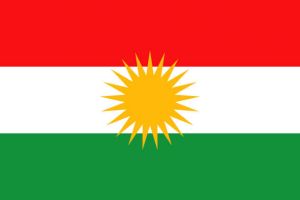Language/Southern-kurdish/Grammar/Pronouns
Hi Southern Kurdish learners! 😊
In this lesson, we will dive into the wonderful world of pronouns. A pronoun is a word that takes the place of a noun. They are an essential part of any language, including Southern Kurdish. By the end of this lesson, you will have a solid understanding of Southern Kurdish pronouns and be able to use them with confidence. Don't forget to find native speakers and ask them any questions!
Personal Pronouns[edit | edit source]
Personal pronouns are pronouns that refer to people or things. In Southern Kurdish, personal pronouns are classified into first person, second person, and third person.
First Person[edit | edit source]
First person pronouns refer to the speaker, or the speaker along with other people. In Southern Kurdish, we have a singular and plural first person pronoun.
| Southern Kurdish | Pronunciation | English |
|---|---|---|
| من (1 Singular) | /mæn/ | I, Me |
| ئامێدەم (1 Plural) | /ɑːmeːde/ | We, Us |
Dialogue:
- Person 1: من خیری بەرجەستە؟ (Min khiri berjesta?) (Am I invited?)
- Person 2: نەتوانی خۆت بەرجەست بکەی (Netwani khoet berjesta bikei) (You can't invite yourself)
- Person 1: ئامێدەم سەرۆکی یاری بیانیم (Ameydema saroki yari bianim) (We are the leaders of our team)
Second Person[edit | edit source]
Second person pronouns refer to the person or people being spoken to. In Southern Kurdish, we also have singular and plural forms.
| Southern Kurdish | Pronunciation | English |
|---|---|---|
| تۆ (2 Singular) | /tʊ/ | You |
| هەمووتان (2 Plural) | /hemûtɑn/ | You all, Y'all |
Dialogue:
- Person 1: تۆ ئەو کتێبە بشێوە لە مەکتەبە؟ (To ew ketêbe bshawe lə mekteb?) (Did you borrow that book from the library?)
- Person 2: نە، ئەو کتێبە دابنێم (Næ, ew ketêbe dabnêm) (No, I bought that book)
Third Person[edit | edit source]
Third person pronouns refer to someone or something that has already been mentioned or is being talked about. Southern Kurdish also has singular and plural forms.
| Southern Kurdish | Pronunciation | English |
|---|---|---|
| لەو (3 Singular) | /lewa/ | He, She, It |
| هەمووان (3 Plural) | /hemûân/ | They |
Dialogue:
- Person 1: لەو، فۆنەت چییە؟ (Lew, fône tshiya?) (What's on his/her/its phone?)
- Person 2: فۆنی خۆیە، ناتاوە (Fone khoie, nåtawe) (It's their own phone, don't touch it)
- Person 1: دوو خوێندکاران دەخوازن (Dwawa khwendkaran dakhoazan) (Two students are knocking on the door)
- Person 2: هەمووان بەناویەکیان بابەت پێداچوون (Hemûân benawiêkêyan babeet pêdachûn) (They all attended the same class)
Demonstrative Pronouns[edit | edit source]
Demonstrative pronouns are used to point, demonstrate or distinguish a specific person or thing. In Southern Kurdish, there are two types of demonstrative pronouns: proximal and distal.
Proximal Demonstrative Pronouns[edit | edit source]
Proximal demonstrative pronouns refer to something that is near the speaker or that is being pointed to.
| Southern Kurdish | Pronunciation | English |
|---|---|---|
| ئەم (Proximal) | /æm/ | This (singular) |
| ئەمان (Proximal) | /æmɑn/ | These (plural) |
Dialogue:
- Person 1: ئەم کتێبە خۆشە بۆشایە (Am ketêbe khoesha boshaeya) (This book is interesting)
- Person 2: ئەمانە هەروەها کتێبەکانەن (Amāne herwehea ketêbekanen) (These are all the books)
Distal Demonstrative Pronouns[edit | edit source]
Distal demonstrative pronouns refer to something that is far from the speaker or that is being pointed to.
| Southern Kurdish | Pronunciation | English |
|---|---|---|
| ئەو (Distal) | /ɑw/ | That (singular) |
| ئەوان (Distal) | /ɑwɑn/ | Those (plural) |
Dialogue:
- Person 1: ئەو خۆتۆکی لە خانەکەدا دەبێ (Aw khoetoki le khaneke da dabê) (That selfish person living in that house)
- Person 2: ئەوان بووکەەکان دەمردنە (Awāne bookêkane demirdane) (Those books are interesting)
Interrogative Pronouns[edit | edit source]
Interrogative pronouns are used to ask questions to learn more about a specific person or thing. In Southern Kurdish, we have two interrogative pronouns.
| Southern Kurdish | Pronunciation | English |
|---|---|---|
| کێ (Who) | /kæj/ | Who |
| چی (What) | /tʃi/ | What |
Dialogue:
- Person 1: کێ بۆیە لەو قوشەیە، ئەوە چی؟ (Kæy boie lew qosheaew, awe tshi?) (Who owns that bird, and what kind is it?)
- Person 2: ئەو قوشە پەپەڕجەیە (Awe qoshe pepærjea) (That bird is a sparrow)
Reflexive Pronouns[edit | edit source]
Reflexive pronouns are used to indicate that the subject of the sentence both performs and receives the action of the verb. In Southern Kurdish, we have four reflexive pronouns.
| Southern Kurdish | Pronunciation | English |
|---|---|---|
| خۆی (Singular) | /xoeî/ | Himself, Herself, Itself |
| خۆمان (Plural) | /xomɑn/ | Themselves |
| خۆتان (Plural) | /xotɑn/ | Yourself (plural), Yourselves |
| خۆ (Singular) | /xo/ | Oneself |
Dialogue:
- Person 1: هێشتا خۆمان گشتووە (Heshta xoman gêștoe) (They left by themselves)
- Person 2: ئەگەر تۆ خۆتان بەچاوت بدەی ئەوا ئەو بەو گەشتەکە بچوونی (Eger to cotan bexawt bde ai awe bew gashteka bchouoni) (If you take care of yourselves, you can finish that walk)

